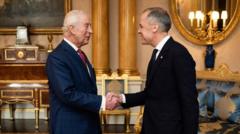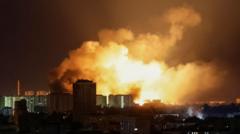Israeli airstrikes on Syria have diminished significantly since President Trump's recent decision to lift sanctions on Syria and engage with its leadership.
Trump's Shift in Syria Policy Alters Israel's Military Operations

Trump's Shift in Syria Policy Alters Israel's Military Operations
In an unexpected turn, President Trump's outreach to Syria has led to reduced Israeli military action in the region.
In Jerusalem, Israeli defense strategies are now adjusting as the pace of airstrikes has slowed following the U.S. president's meeting with Syria's new leader, Ahmed al-Shara.
As reports indicate, over 700 attacks were executed by Israel in Syria after the fall of Bashar al-Assad's regime due to Islamist rebellion, mostly targeting groups viewed as threats to Israel's security. Key Israeli officials emphasized the importance of preventing hostile organizations from gaining a foothold in southern Syria, particularly in light of lessons learned from conflicts in southern Lebanon, where militant groups like Hezbollah operated.
However, a notable shift occurred on May 14, when President Trump met with al-Shara, declaring plans to remove sanctions imposed on the country which had been in effect for nearly 14 years due to the civil unrest. Trump's perception of al-Shara brought a softer edge to the prospect of Syrian governance, which shocked many in the Israeli administration who have consistently labeled the new leadership as "extremist."
Following this pivotal meeting, the frequency of Israeli strikes in Syria has largely declined, marking a significant change in tactical engagements that had previously characterized the conflict-ridden area. The international ramifications of this decision remain to be seen, as both the Israeli government and military reassess their strategies moving forward in a more unpredictable landscape.
As reports indicate, over 700 attacks were executed by Israel in Syria after the fall of Bashar al-Assad's regime due to Islamist rebellion, mostly targeting groups viewed as threats to Israel's security. Key Israeli officials emphasized the importance of preventing hostile organizations from gaining a foothold in southern Syria, particularly in light of lessons learned from conflicts in southern Lebanon, where militant groups like Hezbollah operated.
However, a notable shift occurred on May 14, when President Trump met with al-Shara, declaring plans to remove sanctions imposed on the country which had been in effect for nearly 14 years due to the civil unrest. Trump's perception of al-Shara brought a softer edge to the prospect of Syrian governance, which shocked many in the Israeli administration who have consistently labeled the new leadership as "extremist."
Following this pivotal meeting, the frequency of Israeli strikes in Syria has largely declined, marking a significant change in tactical engagements that had previously characterized the conflict-ridden area. The international ramifications of this decision remain to be seen, as both the Israeli government and military reassess their strategies moving forward in a more unpredictable landscape.




















